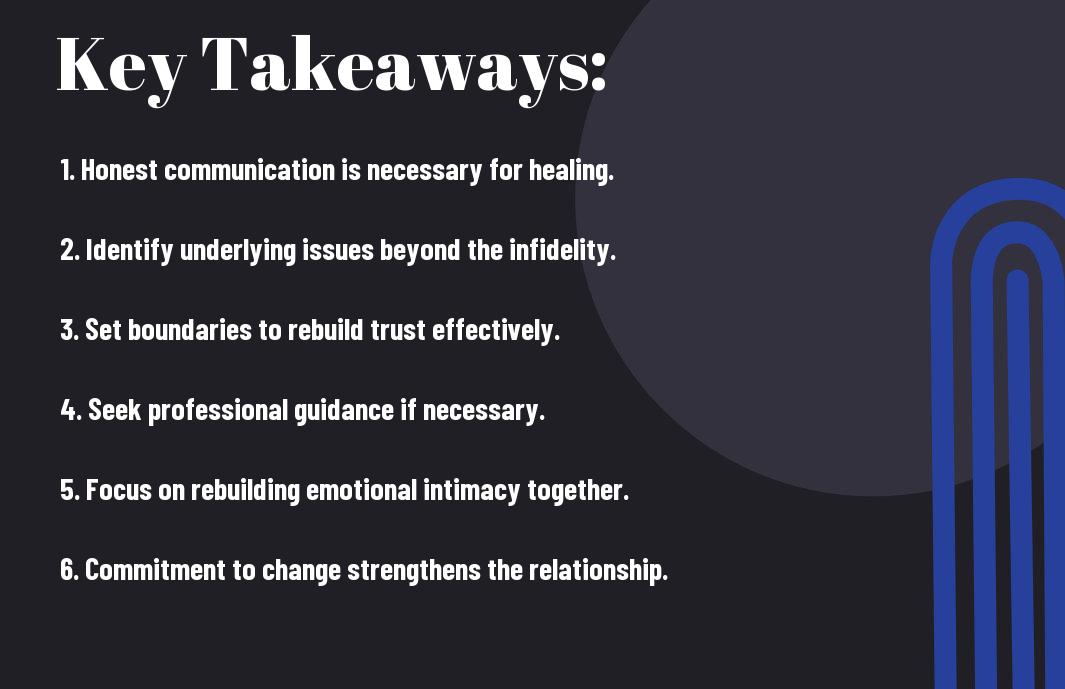Over the years, many couples have faced the painful reality of infidelity, leaving you to question whether love can truly endure after such a betrayal. While the journey towards healing can be challenging, understanding how to navigate the path can ultimately lead to a stronger marriage. This guide will offer you insights and strategies on rebuilding trust, fostering open communication, and rekindling the love that may have felt lost.

Key Takeaways:
- Open communication between partners is vital for rebuilding trust after infidelity.
- Understanding the underlying issues that contributed to the infidelity can help in addressing relationship problems.
- Both partners should be willing to engage in individual and couples therapy to facilitate healing and growth.
- Setting boundaries and expectations post-infidelity is important for creating a safe space for both partners.
- Rebuilding intimacy takes time and effort; couples should be patient with themselves and each other during this process.
- Forgiveness is key, but it doesn’t mean forgetting; both partners need to work through their emotions together.
- Strengthening the relationship may involve exploring new ways to connect and rekindle passion and affection.

Understanding Infidelity
Your journey into the complexities of infidelity begins with understanding its various facets. Infidelity isn’t just about betrayal; it encompasses emotional, physical, and digital breaches of trust that can leave deep scars on a relationship. Exploring the underlying reasons for these actions can provide insight into the struggles faced by couples, helping to foster healing and reconnection.
Types of Infidelity
Your awareness of the different types of infidelity can contribute significantly to your understanding and healing process. Here are the main categories:
- Emotional Infidelity: Involves deep emotional connections with someone outside the marriage.
- Physical Infidelity: Refers to sexual involvement with another person.
- Online Infidelity: Engagement in romantic or sexual relationships through social media and dating apps.
- Micro-Cheating: Small acts that, while not necessarily sexual, can undermine trust.
- Consensual Non-Monogamy: Involves agreements that expand the boundaries of a relationship.
Any understanding you gain about these forms of infidelity can help you navigate the complex emotions involved in a marital crisis.
| Type of Infidelity | Description |
| Emotional Infidelity | Deep emotional connections outside marriage. |
| Physical Infidelity | Sexual relationships with someone else. |
| Online Infidelity | Romantic exchanges via digital platforms. |
| Micro-Cheating | Small actions that betray trust. |
| Consensual Non-Monogamy | Agreed-upon non-exclusive arrangements. |
Psychological Impact on Partners
Partners often experience a range of emotions following an incident of infidelity. Feelings of betrayal, shame, and confusion are common, deeply impacting mental well-being. Trust, a significant foundation of relationships, can erode, leading to anxiety and depression in one or both partners. Acknowledging these feelings is vital in the healing process.
A significant emotional upheaval can occur after infidelity. The partner who has been wronged may deal with a profound sense of loss and insecurity, questioning their worth and the validity of the relationship. On the other hand, the offending partner might face intense guilt or shame, complicating their ability to communicate and show remorse. This dual struggle illustrates the importance of seeking professional support and open dialogue to foster understanding and eventually rebuild a stronger, more resilient bond.

The Path to Forgiveness
While the journey to forgiveness can be a challenging one, it is necessary for rebuilding trust and intimacy in your relationship. Take the time to process your emotions and understand the feelings that have emerged from the infidelity. As you work towards forgiveness, it is important to acknowledge the pain and hurt but also to focus on healing together as a couple.
Open Communication
Between both partners, open communication is vital for navigating the path to forgiveness. Clear discussions about feelings, expectations, and concerns will create a safe space for transparency, helping you both understand each other better. Make it a point to express your needs and listen actively to your partner’s perspective in order to rebuild a foundation of trust.
Setting Boundaries
The process of setting boundaries involves creating guidelines that foster safety and respect within your marriage as you heal from the infidelity. By establishing clear rules about what is acceptable and what is not, you lay the groundwork for a healthier relationship moving forward.
Another important aspect of setting boundaries is being specific about your expectations. Discuss what behaviors are no longer acceptable, and outline how you both will navigate friendships and social situations to avoid misunderstandings. Consider creating boundaries that include checking in with each other regularly, ensuring transparency in your interactions, and committing to prioritizing your relationship’s emotional safety. Strong, defined boundaries can protect your marriage as you work to recover from past wounds.
Rebuilding Trust
Despite the pain caused by infidelity, rebuilding trust can be a transformative process for your marriage. It requires an ongoing commitment from both partners to engage in open communication, demonstrate accountability, and cultivate vulnerability. As you navigate this challenging journey, patience and mutual understanding will be vital in mending the emotional wounds and fostering a deeper connection.
Consistency and Transparency
Consistency is key to restoring faith in your relationship after infidelity. By establishing and adhering to clear boundaries, both partners can begin to rebuild a sense of security. Open and honest communication about feelings, intentions, and actions allows you to create a transparent environment where both individuals feel safe to express themselves freely.
Seeking Professional Help
Across many cases of infidelity, seeking professional help can provide both guidance and support during this difficult time. A trained therapist can assist you in understanding the underlying issues in your marriage, helping both partners to express their feelings and work toward a resolution.
Transparency is vital when engaging in therapy, as it allows you to explore your emotions and thoughts openly. Therapists can facilitate conversations that might be uncomfortable but necessary for healing. Working with a professional can help you identify patterns that may have led to infidelity, and develop effective communication strategies. Ultimately, this support can play a significant role in fostering a positive atmosphere for rebuilding trust and intimacy in your marriage.
Strengthening Emotional Connection
Now, it’s vital to work on your emotional connection to rebuild trust and intimacy after infidelity. Engage in open dialogues and reflect on your feelings to foster understanding. One way to facilitate this process is by exploring resources like Healing from Infidelity: How to Rekindle Intimacy and …. This guide can provide valuable insights on how to bridge the gap created by betrayal, enabling you both to move forward together.
Quality Time Together
To strengthen your bond, prioritize spending quality time together. Engaging in shared activities or new experiences can rekindle your connection and create positive associations with each other.
Fostering Vulnerability
Any relationship thrives on vulnerability, particularly after a breach of trust. You can foster an environment where both you and your partner feel safe to express your emotions, fears, and aspirations without judgment.
In addition, fostering vulnerability encourages deeper conversations that can heal underlying wounds. When you openly share your thoughts and feelings, you dismantle walls built by distrust, creating an atmosphere of empathy and support. It’s vital to practice active listening and offer reassurance, helping each other navigate the complexities of your emotions. The result is a stronger emotional bond that can weather future challenges.
Preventing Future Infidelity
All relationships require ongoing effort and communication to stay strong. After experiencing infidelity, it’s important to actively work on your partnership to rebuild trust and safeguards against future betrayals. This involves developing healthy habits, setting boundaries, and fostering emotional intimacy. By prioritizing your connection and addressing any underlying issues, you can create a resilient relationship that withstands the test of time.
Recognizing Red Flags
Before exploring strategies to strengthen your marriage, it’s important to be aware of behaviors that may indicate potential infidelity. Changes in communication patterns, increased secrecy, or emotional distance can be warning signs. By acknowledging these red flags early on, you can address concerns before they escalate and jeopardize your bond.
Creating a Supportive Environment
Between you and your partner, establishing a nurturing atmosphere where both of you feel heard and valued is key to preventing infidelity. It’s important to cultivate empathy, understanding, and open dialogue to address each other’s needs and concerns. This supportive foundation enables you to tackle issues together and reinforces your commitment to one another.
With a focus on creating a supportive environment, you can foster a sense of safety and trust that deters infidelity. Make time for regular check-ins to discuss feelings and expectations, and encourage vulnerability in conversations. Celebrate each other’s successes and acknowledge struggles to strengthen your connection. Engaging in shared activities and nurturing mutual interests will also enhance your emotional bond, ultimately shielding your relationship from the temptations of infidelity.
When to Let Go
Many couples grapple with the question of whether to stay together after an affair. It is vital to assess the emotional climate of your relationship, the willingness of both parties to commit to healing, and whether the trust shattered by infidelity can be rebuilt. If communication and reconciliation efforts seem futile, it might be time to consider letting go and focusing on your individual growth and happiness.
Signs of Irretrievable Breakdown
Any signs of persistent unhappiness, lack of trust, or emotional detachment in your relationship could indicate an irretrievable breakdown. If efforts to reconnect consistently fail and both partners are no longer willing to work on the relationship, it may be time to recognize that healing is unattainable and consider moving on for your well-being.
Navigating Separation
Beside emotional pain, navigating separation can also entail practical challenges such as financial implications and the effects on your family. It is vital to approach this phase thoughtfully to minimize distress and conflicts.
Navigating separation requires careful consideration, as both you and your partner may experience a range of emotions including confusion, anger, and sadness. During this time, seek support from friends, family, or professional counselors to process your feelings. Establish clear boundaries and consider legal implications if necessary. Focusing on your personal well-being will aid in healing and provide a stronger foundation for future relationships. Prioritize open communication if you’re co-parenting, ensuring your children are supported throughout this transition.
Final Words
Hence, understanding that love can indeed survive infidelity is the first step toward rebuilding your marriage. By confronting the underlying issues, fostering open communication, and embracing transparency, you can create a stronger bond with your partner. It requires patience and commitment from both sides, but with dedication, you have the power to transform your relationship into one rooted in trust and resilience. Take these insights to heart and initiate on a journey toward healing and renewal together.
FAQ
Q: What are the first steps a couple should take after infidelity has been discovered?
A: The initial step is to acknowledge the pain and emotions that both partners are experiencing. Open communication is vital; both partners should express their feelings honestly, while also listening to each other. Creating a safe space for discussion can help facilitate healing. It may also be beneficial to seek professional help from a marriage counselor or therapist who specializes in infidelity recovery.
Q: Can a marriage truly recover from infidelity?
A: Yes, many couples can and do recover from infidelity. Recovery requires commitment from both partners to work on the relationship. This involves a willingness to address underlying issues, rebuild trust, and improve communication. Couples who actively engage in these processes often find their relationships are stronger and more fulfilling than before infidelity occurred.
Q: What role does forgiveness play in overcoming infidelity?
A: Forgiveness is a pivotal component in moving past infidelity. It allows the wronged partner to let go of bitterness and resentment, which can block healing. However, forgiveness does not mean condoning the betrayal; rather, it represents a choice to release negative feelings and work toward rebuilding the relationship. It often takes time and effort, both from the hurt partner and the one who was unfaithful, to foster genuine forgiveness.
Q: How can couples rebuild trust after infidelity?
A: Rebuilding trust requires transparency and consistency. The partner who was unfaithful should openly share their actions and emotions while also being receptive to the hurt partner’s feelings. It’s important to establish new boundaries and demonstrate commitment to the relationship through actions over time. Regularly checking in with each other can help both partners stay on the same page as they work towards restoring trust.
Q: What can couples do to strengthen their marriage after overcoming infidelity?
A: Couples can focus on open communication, which breeds understanding and connection. Additionally, they should prioritize quality time together, exploring shared interests and creating new experiences as partners. Setting relationship goals, such as improving emotional intimacy or enhancing conflict resolution skills, can also be beneficial. Engaging in couples’ therapy can provide ongoing support and help solidify a stronger marriage moving forward.
